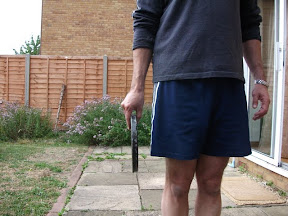My body’s response to any particular work-out programme varies with time. Assuming I start with a new work-out I always go through the following phases:
When I reach a plateau it is time for a change. And because these changes are the rule rather than the exception I feel it is very important to
- Shock. The body, faced with a new and unfamiliar task, struggles to cope. Aches and pains and the realisation that I wasn’t as fit as I thought. This period is brief and I take it very easy.
HorrorAdaptation. Performance increases rapidly. This is the most dangerous period for getting injuries because it is difficult to tell if I am overdoing it.- Plateau. Performance remains flat. It is possible to squeeze out some more performance by making small changes but essentially my body is now fully adapted to the workout and considers it “business as usual” – no need to improve further as it is perfectly capable of meeting the current level of demand.
Anyway, the topic of this post is to describe some more of my grip warm-up exercises. So here goes:
- Have a repertoire of different exercises for any given fitness “target”, (e.g. a target could be “shoulder strength”)
- Make sure my exercise regime includes a variety of elements like running, weight lifting, cycling, so that if I hit a plateau in one of them I can shift my focus on another for a period.
This is an exercise I learned many years ago. I basically open up my hands and then make them into fists as fast as I can for as long as I can. It doesn’t sound challenging but believe me it is.
When my hands start burning I may move on to using a light weight to warm up my thumbs. I use a plate with a “lip” for this so that I can hook my thumb under it.
I make sure I let the weight drop all the way down and lift it all the way up.
Sometimes I use a bar for warm-up. An Olympic bar, like the one in the picture, is heavy enough (20kg) to be used without additional weights for warm-up.








